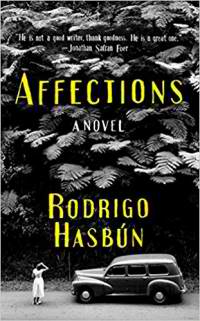Affections by Rodrigo Hasbún
 Friday, October 6, 2017 at 10:08AM
Friday, October 6, 2017 at 10:08AM 
Published in Spanish in 2015; published in translation in 2016; published by Simon & Schuster on September 12, 2017
A German family relocates to La Paz after World War II. The father, Hans Ertl, was a cameraman for Nazi filmmaker/propagandist Leni Riefenstahl. By the 1950s, Hans has reinvented himself as an explorer/photographer/documentarian. He disappears for months at a time, usually to climb mountains, but his goal as the novel starts is to find the lost city of Paitití. His daughter Monica, who doesn’t want to be in La Paz, agrees to join him on his quest, as does her sister Heidi. Point of view shifts from Heidi to her sister Trixi, who stays home with their mother Aurelia while Monica and Heidi are in the jungle with their father.
The novel tracks the family over a period of decades, but this is a short novel, so there are significant gaps in the family history after the search for Paititi. The story is set against a background that includes the Bolivian revolution, the military dictatorships that followed, and the unsuccessful guerrilla war waged by Che Guevara and others to bring down the dictatorships.
The background moves into the forefront when the novel focuses on Monica’s lover Reinhard, who is also the brother of her husband. Chapters devoted to Reinhard are told in Reinhard's voice, in the form of answers to questions, conveying the impression that Reinhard is being interrogated as he talks about Monica, who fell in love with a Bolivian guerrilla named Inti and became an indispensable part of the revolutionary movement. A brief chapter gives us the perspective of Inti before he becomes the ill-fated leader of Che’s National Liberation Army.
Toward the end of the 1960s, in the aftermath of Monica’s relationship with Inti, the story again touches upon Hans and his daughters. Hans has reinvented himself (again) after a failed expedition. His relationship with his family is strained, including an inevitable confrontation with Monica who (given her father’s history) should not be surprised by his willingness to tolerate a fascist government.
Affections tells an intense but ambiguous story, based in large part on real people. The events in family members' life are presented superficially but the characters (at least Monica and her father) are drawn in greater depth than the plot. Other characters have a tendency to drift away, giving the novel an episodic and unfinished feel. Rodrigo Hasbún leaves many questions unanswered, the kind of questions a literature professor might ask (What was Hasbún saying when Hans hired workers to dig a deep hole on his property?) and that have no clear answers. I found that mildly frustrating, probably due to my lack of imagination or an anal desire to have all questions firmly answered. But life is frustratingly full of unanswered questions and literature should reflect life, so I can’t fault the novel for doing that. In the end, I admired the novel’s atmosphere, its portrayal of key characters, and Hasbún’s prose. That’s enough to overcome my puzzlement and to earn a recommendation.
RECOMMENDED